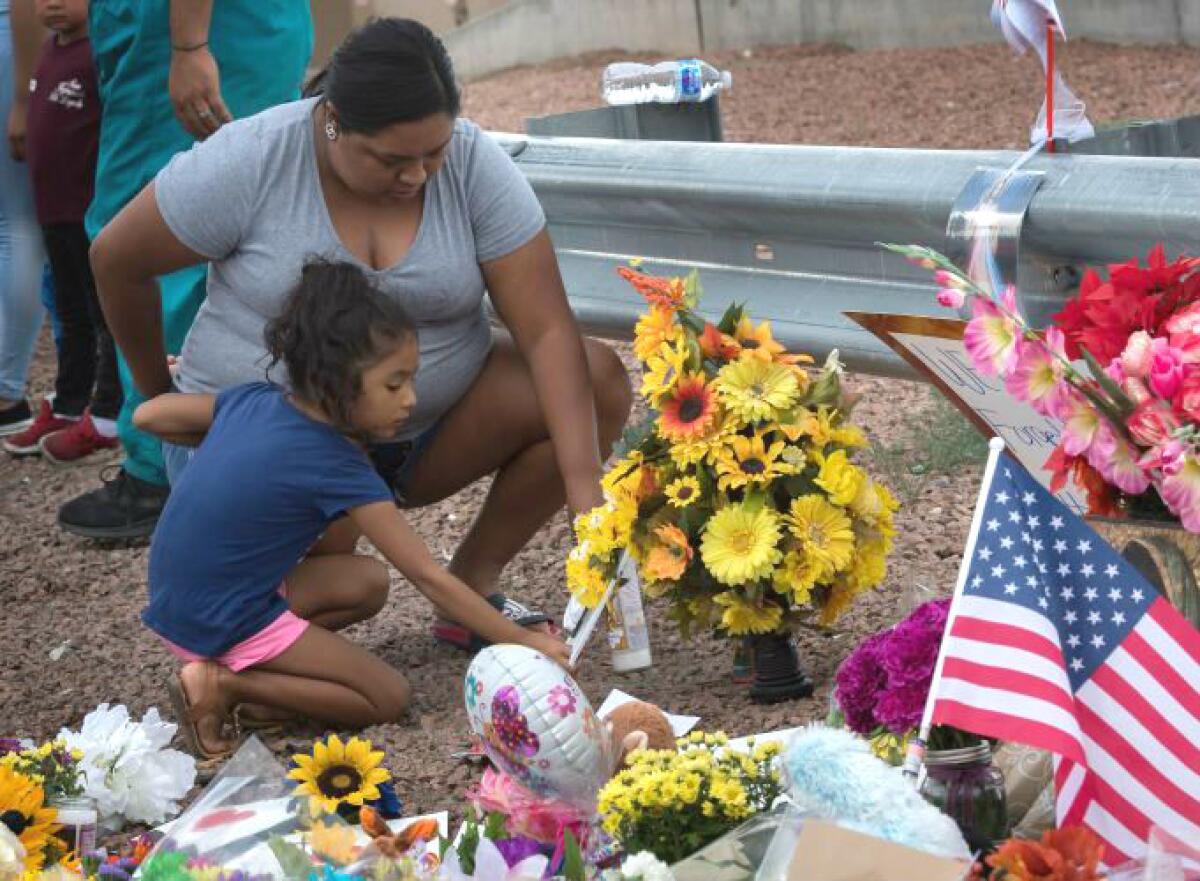Trump officials have redirected resources from countering far-right, racism-fueled domestic terrorism

- Share via
WASHINGTON — In the aftermath of mass shootings in Texas and Ohio, President Trump vowed Monday to give federal law enforcement “whatever they need” to investigate and disrupt hate crimes and domestic terrorism.
But the Department of Homeland Security, which is charged with identifying threats and preventing domestic terrorism, has sought to redirect resources away from countering anti-government, far-right and white supremacist groups.
The shift has come despite evidence of a growing danger. Last year, every extremist killing in the United States involved a follower of far-right hate groups or ideology, according to the Anti-Defamation League’s Center on Extremism. The FBI has noted a sharp increase in domestic terrorism cases involving white supremacists.
In June, the acting secretary of Homeland Security, Kevin McAleenan, told Congress that “white supremacist extremist violence” is “an evolving and increasingly concerning threat.”
Under Trump, 85% of the “countering violent extremism” grants awarded by Homeland Security explicitly targeted Muslims and other minority groups, including immigrants and refugees, more than under the Obama administration, according to an analysis by the Brennan Center for Justice, a nonpartisan policy institute at the New York University School of Law.
Homeland Security officials did not respond to requests for comment Monday, but the former officials said the department is working on a draft of a plan that includes a focus on domestic terrorism and mass casualty events.
In April, McAleenan announced a new Office of Targeted Violence and Terrorism Prevention, including “racially motivated violence.” It appears to largely be a rebranding of an Obama-era initiative.
Under President Obama, the office had about 40 full-time staff and a $24-million annual budget, according to Nate Snyder, an Obama administration counterterrorism official. The office now has fewer than 10 full-time employees and a budget below $3 million.
“You have some very dedicated government employees still at the office dealing with terrorism prevention and just trying to keep the lights on,” Snyder said.
After Trump’s election, members of his transition team told Homeland Security officials they wanted to reorient programs meant to combat violent extremism to focus more on the threat posed by radical Islamic terrorism.
But right-wing and anti-government groups have carried out more domestic attacks, and killed more Americans, than foreign terrorist groups since 2001, data show.
According to the most recent FBI data, hate crimes increased for the third straight year in 2017, rising 17% from 2016. The FBI warned this week that the risk of future attacks may be growing as well.
“The FBI remains concerned that U.S.-based domestic violent extremists could become inspired by these and previous high-profile attacks to engage in similar acts of violence,” the FBI said in a statement Sunday after the attacks in El Paso and Dayton, Ohio.
Federal authorities have been slow to acknowledge the danger, focusing chiefly on terrorist threats from Islamist groups and sympathizers, including Al Qaeda and Islamic State, since the Sept. 11, 2001, attacks.
“Very little has been done on white supremacist ideology,” said Seamus Hughes, deputy director of the Program on Extremism at George Washington University. “Unfortunately, it’s been a bipartisan glaring hole in the countering violent extremism policy response.”
In his comments Monday, Trump appeared to blame mental illness for the latest mass shootings, not ideology. “Mental illness and hatred pull the trigger, not the gun,” he said at the White House.
But numerous studies disprove the theory that terrorism is a mental health problem, according to the Brennan Center for Justice.
Obama issued a rare statement Monday underscoring the growing threat of white supremacist and racism-motivated domestic terrorism.
“While the motivations behind these shooting may not be fully known, there are indications that the El Paso shooting follows a dangerous trend,” Obama tweeted. “Troubled individuals who embrace racist ideologies and see themselves obligated to act violently to preserve white supremacy.”
Rep. Bennie Thompson (D-Miss), who chairs the House Homeland Security Committee, was more pointed in his criticism.
“White supremacist terrorism ... is on the rise and is now our top domestic terrorism threat,” Thompson said Monday. “Those that looked the other way for years — or enabled right-wing extremism for political advantage — are on notice.”
More to Read
Get the L.A. Times Politics newsletter
Deeply reported insights into legislation, politics and policy from Sacramento, Washington and beyond. In your inbox twice per week.
You may occasionally receive promotional content from the Los Angeles Times.











